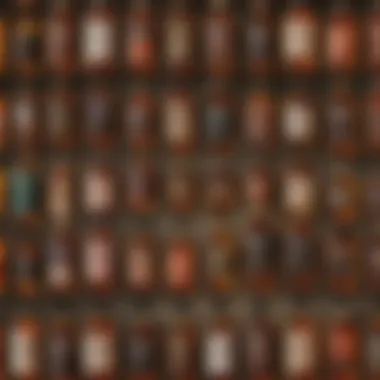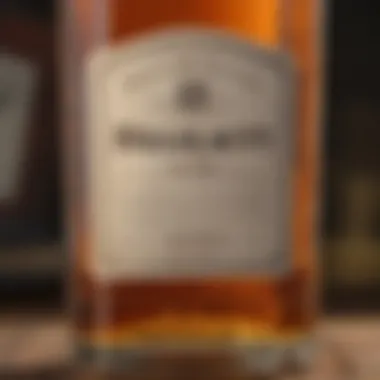Discover the Best Irish Whiskey: A Buying Guide


Intro
Whiskey in Ireland has transcended its role as a mere beverage; it embodies cultural heritage, craftsmanship, and a unique array of flavors that captivate enthusiasts worldwide. Choosing the best whiskey to buy in this vibrant locale involves more than picking a popular name off a shelf. An understanding of styles, maturing processes, and label nuances is essential.
From the silky smoothness of Jameson to the peaty depth of Connemara, Irish whiskeys cater to diverse palates. The age of the whiskey plays a vital part in its taste—older options may boast complexity, while younger ones shine with vibrancy. Many brands employ varied production techniques, adding variations that further enrich the drinking experience.
In the following sections, readers will find insights into different whiskey categories, from single malts to blends, alongside tips for discerning quality. This knowledge empowers one to make confident and personalized selections while exploring the robust Irish whiskey landscape.
Foreword to Irish Whiskey
Understanding Irish whiskey is crucial for anyone looking to explore the world of premium spirits. This section provides background into what makes Irish whiskey distinct. It highlights the historical, cultural, and technical aspects that contribute to its allure in the drinking community. Those interested in buying whiskey should have a solid foundation to make informed choices.
Historical Context
Irish whiskey has deep roots, it dates back as early as the 12th century. The craft of distillation was possibly introduced by monks studying in the Middle East. By the 17th century, distillation held a significant economic position in Ireland. But struggles arose during the 19th century including wars and Prohibition, leading to a decline in production and international reputation.
Recent years, however, have changed this negative trajectory. More distilleries reopened to offer higher quality and specialized products. This revival showcases how far the industry has come, with innovative techniques honoring traditional methods. Awareness of this history enriches a drinker's appreciation of Irish whiskey's unique profile.
Unique Production Methods
Unlike other whiskey-producing regions, Irish whiskey primarily uses three unique techniques. These contribute to the smooth taste profiles it is known for.
- Triple Distillation: Most Irish whiskeys undergo triple distillation, which helps produce a cleaner and more refined spirit compared to its Scottish cousins.
- Barrel Aging: Following distillation, the whiskey is aged in wooden casks. Typically, these casks are used barrels from bourbon or sherry, lending a distinct flavor.
- Malting Process: In many cases, distilleries use a mix of malt and unmalted grains. This unique blend of ingredients gives rise to the rich variety of flavors.
Understanding these methods provides insight into the subtle variations between brands and styles and makes for a more committed sipping experience.
Informed drinkers can appreciate the variations in texture and flavor, influenced not just by the ingredients but by every stage of production.
Types of Irish Whiskey
Understanding the different types of Irish whiskey is crucial when selecting a bottle. These categories reflect not only the production methods but also influence the flavor profile and characteristics of the whiskey. Each has its own unique appeal, catering to varying palates and preferences. Knowing these distinctions makes it easier to identify a whiskey that truly aligns with your individual tastes. Below, we examine the four primary types.
Single Malt Whiskey
Single malt whiskey comes exclusively from malted barley and is distilled at a single distillery. The traditional pot still method entails slow distillation, enhancing the final flavor. Single malt options typically showcase expressive taste profiles; common notes include fruits, spices, and often undertones of sherry due to bourbon cask aging or sherry cask aging.
Brands like Redbreast and Teeling stand out in this category. The meticulous grain selection and distillation process grants this whiskey a full-bodied experience that aficionados appreciate. The regulations surrounding production ensure that consumers enjoy a spirit steeped in quality and heritage.
Single Pot Still Whiskey
Single pot still whiskey is another distinctive type, made from a mix of malted and unmalted barley. This style has a long-standing legacy, dating back to times when distilleries had to adapt the grain mix available to them. The combination results in a rich and creamy texture.
This style is largely associated with brands such as Jameson and Green Spot. The result is a more robust whiskey with spicy and fruity notes that intrigue the palate. Its production process emphasizes traditional craftsmanship, establishing a product that is deeply cultural and historical.


Grain Whiskey
Grain whiskey differs significantly from its counterparts in that it can include other grains such as corn, wheat, or rye along with barley. This type often utilizes continuous column distillation, making it a more economical production option. The outcome is typically lighter, smoother, and less complex than other styles.
This doesn't detract from its quality; grain whiskey serves as a base for many blended whiskeys. Brands like Kilbeggan and Dingle are noted producers that present excellent options. Grain whiskeys usually provide a pleasant and approachable sipping experience, often featuring sweet and vanilla flavors.
Blended Whiskey
Blended whiskey combines different types of whiskey, such as single malt, single pot still, and grain. This blending facilitates a medley of flavors that contribute to a balanced profile. By amalgamating various whiskeys, distillers can create a final product that harmonizes the strengths of each individual component.
The flagship brand, Jameson, has gained limestone groundwater fame due to its versatile and consistent quality. There are many blended whiskeys on shelves today, providing countless options for those seeking variety. Blended whiskey has a broad appeal, catering both to the distillery’s signature style and the drinker's palate preferences.
Understanding these four primary styles equips you to make more informed choices when selecting Irish whiskey, enriching your overall experience with every sip you take.
Top Irish Whiskey Brands
Understanding the landscape of whiskey brands in Ireland is crucial for enthusiasts and casual drinkers alike. The brands featured here have established their names through unique qualities, long histories, and commitment to tradition. Choosing whiskey from a reputable brand enhances the buyer's overall experience, ensuring quality and flavor. This segment highlights key brands and offers insights into their characteristics.
Jameson
Jameson is undoubtedly one of the most recognized names in the world of Irish whiskey. Founded in 1780, the brand is celebrated for its smooth and approachable character, making it a favorite among both new and seasoned whiskey drinkers. The triple distillation process commonly used in its production contributes to a lighter palate with notes of vanilla and spices. Furthermore, Jameson is often used as a base for cocktails, popularizing its essence across global bars.
Bushmills
Bushmills, originating from County Antrim, claims the title of the oldest licensed distillery in the world, having opened in 1608. This brand offers a selection of aged single malts, showcasing the craftsmanship that challenges the standard perception of Irish whiskey. Floral and fruity flavors appear in their expressions, often accompanied by a subtle nuttiness. Bushmills remains a crucial player within the premium whiskey market, catering to consumers seeking depth in taste.
Redbreast
Redbreast embraces the traditional methods of small-batch whiskey production, celebrating pot still whiskey specifically. With rich flavors of dried fruit, nuts, and spice, its variants appeal to those who appreciate complexity. The brand has garnered acclaim for its age options, creating an inviting depth for those who desire maturity in their drinks. The commitment to quality at Redbreast endears it to enthusiasts who emphasize craftsmanship.
Teeling
Teeling is a distinct and innovative brand that has breathed new life into the realm of Irish whiskey. Opened in 2015, the Teeling Distillery specializes in small-batch productions and unusual cask finishes. Their whiskey tends to offer unique blends that often include wine and rum cask influences. The brand appeals to adventurous palates and encourages drinkers to explore the intersections between different flavor profiles and aging methods.
Connemara
Connemara provides something distinct in the market: a peated single malt whiskey. Hailing from County Galway, this brand honors the distinct regional flavors of Ireland. Peated whiskeys, commonly associated with Scottish whisky, deliver a smoky, earthy taste. Connemara incorporates local character into its whiskey expressions, attracting those who appreciate a more robust, smokier profile than typical Irish whiskey options.
The selection of a whiskey brand informs much of the drinking experience and can significantly influence the flavor expectation and appreciation of Irish whiskey.
To sum up, each brand of Irish whiskey contributes uniquely to the overall whiskey experience in Ireland. Consumers should factor these distinctive elements into their selections. Awareness of brand histories and characteristics can enhance the decision-making process when selecting whiskey in a local shop or even during a distillery visit.
Factors to Consider When Buying Whiskey
When it comes to quanitifying the quality of whiskey, particularly Irish whiskey, several factors come into play. These aspects are not mere guidelines; they greatly influence your overall experience. Understanding these elements can lead to a more satisfying purchase and a deeper appreciation of the spirit.


Age Statement
The age statement on a whiskey bottle indicates how long the whiskey has been aged in casks. It’s common to perceive older whiskeys as more valuable or of better quality. Generally, maturity allows flavors to develop, leading to a richer profile. However, an age statement doesn’t always determine quality unequivocally. It is essential to remember that some younger whiskeys can be surprisingly enjoyable. Flavor and character significantly depend on the distillation process and the type of barrels used. Therefore, while the age is important, one must not solely rely on it to make a purchasing decision.
Taste Profile
Taste profile is perhaps one of the most vital factors in whiskey buying. Each whiskey offers a unique flavor journey, influenced by factors such as grain type, distillation methods, and wood aging techniques. Familiarizing yourself with various taste profiles is crucial. Irish whiskeys may boast notes ranging from fruity and floral to nutty and spicy. Before buying, consider your palate. Do you prefer something light and smooth or something with depth and complexity? Many distilleries carry flavor wheels that can assist in identifying the kind of profiles you might enjoy. Always remember that personal preference trumps general consensus.
Price Point
With an abundance of options on the market, price points for Irish whiskey vary significantly. Knowing the amount you’re willing to invest in whiskey shapes the options available. While higher price tags often suggest premium quality, this isn't always guaranteed. Additionally, one can find excellent whiskeys that are reasonably priced, thanks to competition in the market. Utilize specified price ranges to eliminate selections that may not fit your budget, whilst still exploring various options available. As a rule, inform yourself of what notable characteristics at each price point include to make a nearly educated and well-rounded choice before purchasing.
“The interaction of age, taste, and price influences every whiskey lover’s journey to uncover their next favorite bottle.”
Where to Purchase Irish Whiskey
Understanding where to purchase Irish whiskey is a crucial part of the journey for any enthusiast. Selecting the right source significantly impacts the experience. Whether you are looking for limited editions or mainstream brands, it is important to know that not all shops are created equal.
Buying whiskey can be a personal experience. Some preferences may align with supporting local businesses, while others might prioritize the best deals or the widest selection. Also, knowledge of where to find whiskey can give you the opportunity to access better casks or unique selections that may not be available everywhere.
Ultimately, sourcing Irish whiskey properly can enrich your appreciation. It can also reveal deeper insights into each brand's hallmark flavor profiles and production methods.
Local Liquor Stores
Local liquor stores provide a significant advantage: they often feature curated collections that reflect the region's taste for specific brands. Visiting a local store allows you to engage with knowledgeable staff who can recommend options based on your palate. Moreover, they may carry exciting selections that larger retailers do not.
Some notable points when considering local stores include:
- Personalized Experience: Local shops give you the chance to discuss preferences with staff.
- Support for Local Economy: Purchasing from these stores contributes directly to your community.
- Tastings and Events: Many smaller establishments host whiskey tastings or educational events that can deepen your understanding.
There’s a unique joy in discovering hidden gems in your town.
Online Retailers
Online retailers present a diverse world of options. With a few clicks, one can source rare bottles that local stores may not stock. They often provide detailed descriptions, customer reviews, and deeper insights into various bottles. However, consider the following when shopping online:
- Price Comparisons: Online shopping allows for quick comparisons to find the best deals.
- Wider Selection: Access to international brands and limited releases that physical stores may lack.
- At-Home Convenience: Save time with door-to-door delivery of the whiskey you desire.
However, ensure that purchasing adheres to legal regulations in your area regarding shipping alcohol for a hassle-free experience.
Distillery Visits
Touring distilleries offers an informative backdrop to your purchase. These visits provide a deeper understanding of the whiskey-making process, including the nuanced choices behind each brand’s distinctive taste.
Consider these benefits:


- Meet the Makers: Engaging in discussions about production can enhance your appreciation.
- Exclusive Offers: Many distilleries have exclusive bottles only available on-site, often at a more attractive price point.
- Immersive Learning: Exposure to the heritage behind the product fosters a richer cultural appreciation.
Learning first-hand the history and craft behind your favorite whiskeys allows for a connection that enhances enjoyment.
Visiting local liquor stores, online retailers, and distilleries are all distinctive paths to discover and acquire Irish whiskey. Each option offers unique benefits and experiences worth exploring.
Tips for Enjoying Irish Whiskey
Enjoying Irish whiskey extends beyond simply pouring a glass. It encompasses one's approach to savoring the rich flavors, discovering new combinations, and appreciating the tradition behind these spirits. This section aims to provide insights and practical advice that enhance the overall drinking experience.
Optimal Serving Conditions
The way you serve Irish whiskey can significantly influence its flavor. Optimum serving temperatures vary between styles, yet generally, whiskey is best served neat at room temperature. This allows the aromas to escape, giving a fuller flavor profile. Some aficionados prefer to add a drop or two of water. This small addition can dilute harsh alcohol notes and unveil complex flavors hidden in the whiskey's spirit. It is essential to use pure water, as mineral content can affect taste. A quality whiskey glass is another fundamental consideration; a tulip-shaped glass naturally collects and focuses the scents and flavors for an enhanced tasting experience.
Pairing with Food
Pairing Irish whiskey with food can be a rewarding venture. The key lies in understanding flavor profiles. For example, Single Malt whiskeys, often characterized by floral and fruity notes, complement seafood beautifully. In contrast, a rich Peated whiskey such as Connemara can work well with grilled meats due to its smoky nature. Here are some suggestions:
- Cheese: Creamy cheeses such as blue cheese pair well with spicy whiskeys.
- Chocolate: Dark chocolate and sherry cask whiskeys can create a memorable dessert course.
- Nuts: Salted nuts enhance the sweetness of blended whiskeys, creating a nice balance.
By experimenting with these combinations, one can discover exciting surprises and deeply satisfying partnerships between flavors.
Exploring Cocktail Options
Irish whiskey is also a fantastic base for various cocktails, having a unique character that rounds out mixed drinks. The Irish Coffee is perhaps the most well-known but delving deeper provides many exciting possibilities. It blends well with classic ingredients like ginger ale and citrus, often highlighted in cocktails such as the Whiskey Sour. This juxtaposition of the room's warmth with the whiskey’s chill can spruce up even the dullest evenings. Here are popular cocktails worth exploring:
- Whiskey Sour: Combining whiskey, lemon juice, and simple syrup.
- Irish Mule: A twist on the classic Moscow Mule using Irish whiskey.
- Jameson and Ginger: Featuring a refreshing mix of Jameson whiskey and ginger ale.
Experimentation is encouraged. Each bartender may have a special spin that showcases both the whiskey’s and their creativity. Embracing these options only enriches your experience of Irish whiskey.
The versatility of Irish whiskey is one quality that elevates it in the world of spirits.
By honing in on optimal serving conditions, food pairings, and cocktail options, one can enjoy the delightful spectrum of Irish whiskey. These tips ultimately foster a deeper understanding and appreciation of a centuries-old tradition.
The End
When one considers the realm of Irish whiskey, the importance of making an informed decision cannot be overstated. This conclusion serves as a recapitulation of the valuable insights discussed throughout the article, particularly the diverse options available, tasting notes to appreciate, and buying considerations tailored to individual preferences.
A thorough understanding of the various types of Irish whiskey—ranging from the robust single malt to the smooth blended variants—equips enthusiasts to choose with precision. Recognizing how age statements and taste profiles influence a whiskey's character strengthens one’s ability to select a bottle that aligns with personal palate profiles. Moreover, prices fluctuate; a budget-savvy approach enhances the enjoyment without compromising quality.
Considerations extend beyond mere selection; where to purchase also presents several avenues. Whether in local liquor stores, through esteemed online retailers, or during intriguing distillery visits, each outlet caters to an unique aspect of the whiskey experience laden with choice.
In essence, taking these factors into account enhances not only the buying journey but elevates ones appreciation for the intricacies involved in whiskey production. Each sip tells a story shaped by history, craft, and dedication, solidifying the cultural significance of Irish whiskey in the broader context of spirits.
Final Thoughts on Irish Whiskey
Irish whiskey, characterized by its smooth profile and rich tradition, offers a rewarding experience for both the uninitiated and the seasoned drinker. The confluence of history and innovation within this spirit illustrates its unique position in the spirits world. Engaging with this amber liquid goes beyond the act of drinking. It-personally invites you to explore its heritage, stories, and diverse flavors.
As the global interest in whiskey continues to burgeon, Irish whiskey remains a steadfast favorite. From the carefully tended distilleries to home kitchens involved in crafting cocktails, its relevance in contemporary drinking culture cannot be ignored. Ultimately, embracing a bottle of Irish whiskey means immersing oneself in the earliest traditions while celebrating modern excellence.
Both socially and gastronomically, Irish whiskey presents a multifaceted option, pairing beautifully with an array of cuisines. Whether cherished neat or in an imaginative cocktail, every take invites magic into a gathered circle of family and friends.







